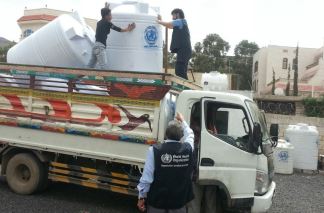 WHO urgently needs US$ 60 million to continue its life-saving response operations across the country until the end of 201520 October 2015, Sana’a, Yemen – Ongoing violence and insecurity continue to limit the delivery of aid in Taiz governorate in Yemen, where more than 3.3 million people, including 300 585 internally displaced persons, are in critical need of health assistance.
WHO urgently needs US$ 60 million to continue its life-saving response operations across the country until the end of 201520 October 2015, Sana’a, Yemen – Ongoing violence and insecurity continue to limit the delivery of aid in Taiz governorate in Yemen, where more than 3.3 million people, including 300 585 internally displaced persons, are in critical need of health assistance.
“The situation in Taiz is alarming,” said WHO Representative in Yemen Dr Ahmed Shadoul. “Hundreds of thousands of innocent civilians need life-saving medicines and health services, food, safe water and fuel. Humanitarian and health needs are increasing and the limited response we have been able to provide is not enough.”
In response, WHO has provided 30 metric tonnes of medicines and medical supplies to Taiz governorate in Yemen, sufficient for 600 000 beneficiaries, including 250 000 people inside Taiz City. The supplies include health kits, including surgical and trauma, diarrhoeal disease kits, interagency emergency health kits, and mother and child health kits. Oxygen cylinders, blood bags and other medical supplies were also distributed to 6 hospitals, 3 health centres and one health office in 6 districts.
In addition, almost one million litres of water are being distributed to Taiz City by WHO, and water quality monitoring is being conducted to reduce the risk of waterborne diseases. Through collaboration with health authorities in Taiz and partner nongovernmental organization the Charitable Society for Social Welfare, WHO has been controlling a dengue fever outbreak in the governorate since earlier this year.
Shortages of fuel and medicines have forced most health units in the villages to shut down, while some hospitals across the governorate have closed their intensive care units. Patients with chronic diseases, such as diabetes, kidney disease and cancer, are unable to access life-saving essential medicines and dialysis centres due to limited access of health facilities and reduced functionality of others.
Shortages in food have led to a significant increase in prices, with many people now unable to afford basic food items, resulting in increased risk of malnutrition, especially in children. The main water wells providing safe drinking-water have shut down due to interruptions in power supply and lack of fuel for generators.
“There is so much more we can do for the people of Taiz, but we need unrestricted access so that we can reach more people, and additional funding to allow us to scale up our response,” said Dr Shadoul. “Unless we are able to overcome these 2 challenges, more innocent lives are at risk. I call on all parties to the conflict to allow delivering aid into Taiz, and for the international donor community to support our work. We urgently need US$ 60 million to continue our life-saving response operations across the country until the end of this year.”
Related link
Read the latest situation reports


